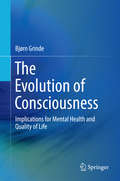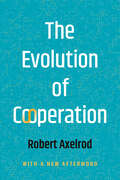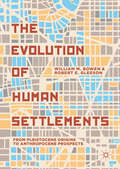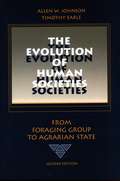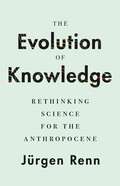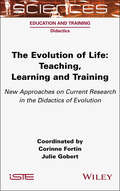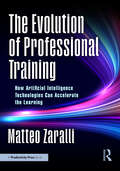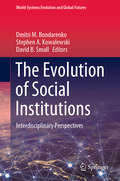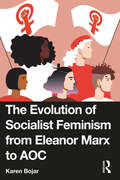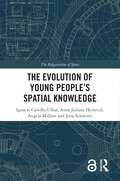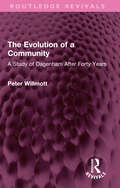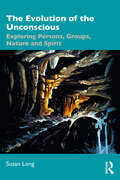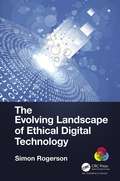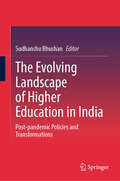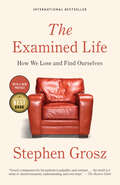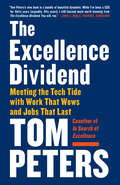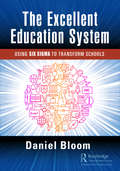- Table View
- List View
The Evolution of Consciousness
by Bjørn GrindeThis book gives the reader an understanding of what consciousness is about, and of how to make conscious experiences more pleasant. It expands on a new theory that describes the evolutionary trajectory leading to conscious life forms. In short, the evidence suggests that consciousness first evolved some 300 million years ago as a consequence of the introduction of feelings. Feelings offer a strategy for making behavioural decisions. Besides playing a crucial role in the evolution of the human mind, they are a key factor in regard to mental health and quality of life. Fortunately, the human brain is plastic. By exploiting available options for modulating the mind, it is therefore possible to impact on what sort of experiences the brain serves. More specifically, you can strengthen the capacity for positive feelings and reduce the sway of negative feelings. The text covers biological, neurological, psychological, and philosophical aspects of the mind.
The Evolution of Cooperation
by Robert Axelrod&“For anyone involved in settling disputes&” (Richard Dawkins), a famed political scientist offers a classic argument for how to achieve a more cooperative world We assume that, in a world ruled by natural selection, selfishness pays. So why cooperate? In The Evolution of Cooperation, political scientist Robert Axelrod seeks to answer this question. In 1979, he organized the famed Computer Prisoner&’s Dilemma Tournament, which sought to find the most effective strategy for the ubiquitous prisoner&’s dilemma, a model of strategy problems in the nuclear age. The expectation had been that some complicated scheme of competition would win the day. Instead, a simple, cooperative program called Tit for Tat did. The effects of that victory continue to reverberate today, from college campuses to the Situation Room. A vital book for leaders and decision-makers, The Evolution of Cooperation reveals how cooperative principles help us think better about everything from military strategy to political elections to family dynamics.
The Evolution of Educational Thought: Lectures on the formation and development of secondary education in France (The\yale Cultural Sociology Ser.)
by Emile DurkheimFirst Published in 2005. Routledge is an imprint of Taylor & Francis, an informa company.
The Evolution of European Identities
by Robert Miller Graham DayThe 'European project' is in a state of perpetual crisis in which the root cause is a lack of identification by ordinary citizens with Europe and European institutions. The Evolution of European Identities employs state of the art analysis of in-depth interviews by renowned practitioners to give a unique 'bottoms up' perspective on the development (or its lack) of a sense of 'European mental space'. Linking conceptual findings with case studies, the book provides unique insights into groups that have been especially sensitized by their life experiences to question what it means to be European in the twenty-first century. The groups explored in this book include: adults who experienced European education exchanges when young; transnational workers; civil society organization activists; persons involved in cross-border intimate relationships; farmers who are subject to European markets, regulations and subsidies; and migrants into 'fortress Europe'.
The Evolution of Household Technology and Consumer Behavior, 1800-2000 (Modern Heterodox Economics)
by Julia Sophie WoersdorferThe increasing division and specialization of labor between the market and the nonmarket sector is a central stylized fact of long-run economic development. Over time, a large share of activities which had formerly been carried out by the private household itself has become replaced by market alternatives, raising at the same time the demand for consumer goods. <P><P> The neoclassical economic framework of household production theory relates the increasing demand for household technology to rising wages and opportunity costs of time: the higher the wage rate, the more costly it is to spend time in unpaid housework activities. Consumer products are thus purchased to make household production processes more efficient and to substitute capital goods for the household’s time (time substitution hypothesis). Although this hypothesis sounds plausible at first sight, it cannot capture the essential phenomena underlying the complex process of the mechanization of the home over the past 200 years. Its major weakness lies in the treatment of consumer preferences, whose explanatory potential is explicitly factored out. <P><P> Using the washing of clothes as a microcosm of household economics, this book examines long-term changes in cleanliness consumption patterns from the perspective of an evolutionary economic, psychologically informed consumer theory. Woersdorfer shows how the historical evolution of cleanliness consumption over the past 200 years is the result of the interplay of supply and demand side factors, namely, technical change in washing technology on one side and motivational driving forces and consumer learning capabilities on the other. Hence, not changing relative prices but innate consumer needs and consumer learning processes, leading to a growing understanding of how to satisfy those needs, are the essential driving forces behind the rising technological endowment of the home and the corresponding demand for household appliances. <P><P> The Evolution of Household Technology and Consumer Behavior, 1800–2000 will be of interest to researchers in the field of evolutionary economics, history of technology, economic history, innovation economics and sociology.
The Evolution of Household Technology and Consumer Behavior, 1800-2000 (Modern Heterodox Economics)
by Julia Sophie WoersdorferThe increasing division and specialization of labor between the market and the nonmarket sector is a central stylized fact of long-run economic development. Over time, a large share of activities which had formerly been carried out by the private household itself has become replaced by market alternatives, raising at the same time the demand for consumer goods.The neoclassical economic framework of household production theory relates the increasing demand for household technology to rising wages and opportunity costs of time: the higher the wage rate, the more costly it is to spend time in unpaid housework activities. Consumer products are thus purchased to make household production processes more efficient and to substitute capital goods for the household’s time (time substitution hypothesis). Although this hypothesis sounds plausible at first sight, it cannot capture the essential phenomena underlying the complex process of the mechanization of the home over the past 200 years. Its major weakness lies in the treatment of consumer preferences, whose explanatory potential is explicitly factored out.Using the washing of clothes as a microcosm of household economics, this book examines long-term changes in cleanliness consumption patterns from the perspective of an evolutionary economic, psychologically informed consumer theory. Woersdorfer shows how the historical evolution of cleanliness consumption over the past 200 years is the result of the interplay of supply and demand side factors, namely, technical change in washing technology on one side and motivational driving forces and consumer learning capabilities on the other. Hence, not changing relative prices but innate consumer needs and consumer learning processes, leading to a growing understanding of how to satisfy those needs, are the essential driving forces behind the rising technological endowment of the home and the corresponding demand for household appliances.The Evolution of Household Technology and Consumer Behavior, 1800–2000 will be of interest to researchers in the field of evolutionary economics, history of technology, economic history, innovation economics and sociology.
The Evolution of Human Settlements: From Pleistocene Origins To Anthropocene Prospects
by William M. Bowen Robert E. GleesonThis book analyzes the history and development of settlements—from the earliest periods in human history to the present day—from a Darwinian evolutionary perspective. At the foundation of the evolutionary model is the argument that the human capacity for complex communication and unique problem-solving ability have led to the formation and reality of the modern city and its scaled-up megacity status. While evolutionary theory forms the platform for the book’s argument, general systems theory provides the operational framework for the organization and interpretations of each chapter. Throughout the book, the authors tackle various issues, questions, and possibilities regarding the future development and evolution of human settlements.
The Evolution of Human Sociability
by Ron VannelliHow do desires and fears motivate human sociability? What effect do these motivators have on reproductive, social and political behaviour? And, crucially, how might we understand them separate from preconceived notions of design or higher morality? Taking these questions as a focus, this book examines human evolution with the emphasis on sexual selection and the evolution of a number of human psychological processes. Exploring evolutionary, sexual and maturational processes, along with primate, fossil and geological evidence, Vannelli argues that human nature can be conceptualised as species-typical desires and fears, derived from sexual selection during human evolution, and that these are major motivators of behaviour. Presenting additional evidence from the anthropology of band societies, along with material from group behaviour, Vannelli highlights the importance of pair-bonding, friendship, alliance behaviour, vengeance seeking and interpersonal politics in social behaviour, providing a unique interdisciplinary framework for understanding human nature and the evolution of human sociability.
The Evolution of Human Societies: From Foraging Group to Agrarian State
by Allen W. Johnson Timothy K. EarleBy combining an original thesis and a representative body of ethnographic data, this ambitious work seeks to describe and explain the growth in complexity of human societies. <P><P> Its emphasis is on the causes, mechanisms, and patterns of cultural evolution, which the authors explain in terms of a coherent theory of political economy defined as the mobilization and exchange of goods and services between families. The authors show that the interconnected processes of technological change and population growth are the motor of social change, resulting in three related processes intensification, integration, and stratification that transform human societies over time. The validity of their theory rests on evidence drawn from 19 case studies that range widely over time and space. <P><P> For this new edition, the authors have thoroughly rewritten the theoretical argument for greater clarity, updated the case materials to incorporate new research, and added a new chapter that applies their theoretical perspective to the problems of change since the industrial revolution and the globalization of trade and political influence.
The Evolution of Knowledge: Rethinking Science for the Anthropocene
by Jürgen RennA fundamentally new approach to the history of science and technologyThis book presents a new way of thinking about the history of science and technology, one that offers a grand narrative of human history in which knowledge serves as a critical factor of cultural evolution. Jürgen Renn examines the role of knowledge in global transformations going back to the dawn of civilization while providing vital perspectives on the complex challenges confronting us today in the Anthropocene—this new geological epoch shaped by humankind.Renn reframes the history of science and technology within a much broader history of knowledge, analyzing key episodes such as the evolution of writing, the emergence of science in the ancient world, the Scientific Revolution of early modernity, the globalization of knowledge, industrialization, and the profound transformations wrought by modern science. He investigates the evolution of knowledge using an array of disciplines and methods, from cognitive science and experimental psychology to earth science and evolutionary biology. The result is an entirely new framework for understanding structural changes in systems of knowledge—and a bold new approach to the history and philosophy of science.Written by one of today's preeminent historians of science, The Evolution of Knowledge features discussions of historiographical themes, a glossary of key terms, and practical insights on global issues ranging from climate change to digital capitalism. This incisive book also serves as an invaluable introduction to the history of knowledge.
The Evolution of Life: Teaching, Learning and Training - New Approaches on Current Research in the Didactics of Evolution
by Corinne Fortin Julie GobertThe aim of this collective work is to give an account of the topicality and dynamics of new research in the didactics of evolution, by articulating francophone and international work. The various contributions pursue a reflection on the challenges of teaching and learning about evolution, based on historical, epistemological and societal approaches. The themes addressed illustrate the vitality and diversity of research issues in educational sciences, from primary school to university. Structured around different theoretical fields (problematization, didactics of the curriculum, nature of science, etc.), this book explores the content, teaching and learning processes and approaches, teaching practices, as well as pre-service and in-service teacher training, with a view to both intelligibility and feasibility.
The Evolution of Professional Training: How Artificial Intelligence Technologies Can Accelerate the Learning
by Matteo ZaralliStructured into three distinct parts, this book is an indispensable resource for navigating the evolution of education and professional training in the age of artificial intelligence (AI) and virtual reality.The book’s Introduction speaks to the current context, a period marked by crisis and a digital industrial revolution, emphasizing how the advent of cutting-edge technologies such as artificial intelligence is fundamentally altering work and social dynamics. It then examines AI, exploring its distinctive features compared to human intelligence and introducing the concept of spatial computing. It illustrates how these technological advancements are expanding the possibilities for human-machine interaction.In the first part, the focus shifts to artificial intelligence, the importance of data in training intelligent systems, and the emerging concept of the augmented worker. This section explores how AI can enhance human capabilities, facilitate more efficient and personalized learning or training, and promote unprecedented professional development.The second part ventures into philosophical reflections and ethical considerations regarding the future of work and AI’s impact on daily reality. It discusses the changing work paradigm, the challenges posed by increasing digitalization, how AI contributes to an altered perception of truth, and the implications of the multiple digital identities that people can assume in virtual spaces. A task and reflection that businessmen, executives, and managers need to consider.Finally, the third part emphasizes the critical importance of training, examining how virtual reality and artificial intelligence technologies can accelerate the learning and mastery of hard and soft skills. This section delves into the different sectors that have been or will be transformed by these technologies’ integration, offering perspectives on how best to prepare for the challenges and opportunities of the future.This book is not just an analysis of the impact of emerging technologies on learning and professional development; it is also an invitation to reflect on the future of work, the nature of intelligence, and the evolution of human society in the digital age. Balancing technical insights with philosophical considerations, it targets a broad audience, from educators to professionals, policymakers to the curious, providing tools to understand and navigate the rapid transformations of our time.
The Evolution of Social Institutions: Interdisciplinary Perspectives (World-Systems Evolution and Global Futures)
by David B. Small Dmitri M. Bondarenko Stephen A. KowalewskiThis book presents a novel and innovative approach to the study of social evolution using case studies from the Old and the New World, from prehistory to the present. This approach is based on examining social evolution through the evolution of social institutions. Evolution is defined as the process of structural change. Within this framework the society, or culture, is seen as a system composed of a vast number of social institutions that are constantly interacting and changing. As a result, the structure of society as a whole is also evolving and changing. The authors posit that the combination of evolving social institutions explains the non-linear character of social evolution and that every society develops along its own pathway and pace. Within this framework, society should be seen as the result of the compound effect of the interactions of social institutions specific to it. Further, the transformation of social institutions and relations between them is taking place not only within individual societies but also globally, as institutions may be trans-societal, and even institutions that operate in one society can arise as a reaction to trans-societal trends and demands. The book argues that it may be more productive to look at institutions even within a given society as being parts of trans-societal systems of institutions since, despite their interconnectedness, societies still have boundaries, which their members usually know and respect. Accordingly, the book is a must-read for researchers and scholars in various disciplines who are interested in a better understanding of the origins, history, successes and failures of social institutions.
The Evolution of Socialist Feminism from Eleanor Marx to AOC
by Karen BojarThe Evolution of Socialist Feminism from Eleanor Marx to AOC traces the intersection of feminism and socialism as it has played out in the socialist movements arising in Europe and North America in the nineteenth through early twenty-first centuries. From well-known figures in the history of socialism, such as Rosa Luxemburg, Sylvia Pankhurst, and Angela Davis, to lesser-known individuals including Claudia Jones, Sheila Rowbotham, and Zillah Eisenstein, this book examines the socialist feminists who have been among the most powerful voices insisting on freedom of expression and participatory democracy within the socialist movement as well as within the larger society. It considers how these figures contributed to what has become a twenty-first-century multiracial grassroots socialist feminist movement led by young women of color, playing a major role in radical movements across the globe.The Evolution of Socialist Feminism from Eleanor Marx to AOC is an important text for undergraduate students of politics, sociology, and gender studies, as well as for the general reader.
The Evolution of Sustainable Investments and Finance: Theoretical Perspectives and New Challenges
by Lucia Michela Daniele Francesco Gangi Antonio Meles Nicola Varrone Dario SalernoOver the last decade, socially responsible investments (SRIs) have become paramount to both professionals and academics. In the aftermath of the financial crisis of 2007-8, practitioners have become much more involved in new financial models that integrate returns and positive social and environmental impacts. The authors argue that previous irresponsible financial models are anachronistic, and propose a new relationship between stakeholder and shareholder. Starting from the mainstreaming of SRI, this book recovers the social function of banks and the innovative role of crowdfunding and venture capital models. The book offers a unified perspective for firm and funder, making it a timely and invaluable read for scholars and practitioners interested in sustainable development and social impact finance.
The Evolution of Young People’s Spatial Knowledge (The Refiguration of Space)
by Angela Million Anna Juliane Heinrich Jona Schwerer Ignacio Castillo UlloaYoung people imagine, perceive, experience, talk about, use, and produce space in a wide variety of ways. In doing so, they acquire and produce stocks of spatial knowledge. A quite dynamic and ever-changing process by nature, young people’s production and acquisition of spatial knowledge are susceptible to many kinds of conditions—from those that shape their everyday routines to those that constitute historical turning points. Against this backdrop and drawing on a qualitative metaanalysis, the authors set out to discover what changes the spatial knowledge of young people has undergone during the past five decades. To that end, sixty published studies were sampled, analyzed, and synthesized to offer a meta-interpretation in terms of both the evolution of young people’s spatial knowledge and the refiguration of spaces. As such, this book will appeal to scholars conducting spatial research on childhood and youth as well as scholars interested in urban studies from diverse disciplines such as sociology, anthropology, geography, architecture, urban planning, and design. The Open Access version of this book, available at http://www.taylorfrancis.com, has been made available under a Creative Commons Attribution-Non Commercial-No Derivatives 4.0 license. The Open Access fee was funded by Technische Universität Berlin
The Evolution of a Community: A Study of Dagenham After Forty Years (Routledge Revivals)
by Peter WillmottIn earlier studies, Peter Willmott and other investigators had documented the social problems of new housing estates – the loneliness, the tensions, the disruption of family and neighbourhood ties. But how far are such troubles transitory? What kind of life would develop in communities like these when time had rubbed off the newness? Originally published in 1963, in search of an answer, Peter Willmott went to Dagenham in Essex, where forty years before the London County Council began to build a giant estate to rehouse people from the East End of London. His study – of a new estate that had now become an old one – throws light on the long-term effects of this kind of migration. He found at Dagenham, most strikingly, that a way of life very similar to a ‘traditional’ working-class community had grown up. In this book he discusses the similarities and differences, and shows the influences which had worked for and against this development. After a sketch of the estate’s history, he traces the relationships of the people of Dagenham with relatives, friends and neighbours, and then examines their attitudes to each other, to politics and to social class. His conclusions were not only relevant to housing and town planning policy, but provided insight into the meaning of social class in contemporary Britain at the time.
The Evolution of the Unconscious: Exploring Persons, Groups, Nature and Spirit
by Susan LongDrawing on over four decades of professional and academic experience, Susan Long explores how the concept of the unconscious has evolved from the nineteenth to the twenty-first century, showing that it is more than an individual phenomenon, but also a group, organisational and institutional phenomena.Each chapter examines theories that use the idea of the unconscious, first covering the work of Schelling, Freud, Bion, and Lacan. After examining traditional psychoanalytic ethos, the author takes a look at the mid-twentieth century extension of the meaning of the unconscious towards the social field. Here, she explores three main traditional categories of approaches: the Neo-Freudians, the Frankfurt School and social scientists, historians and anthropologists. The book also covers the idea of approaching the unconscious from the perspective of the neurosciences, as well as its connections with nature, showing a broader, more cosmic view of the unconscious in nature and the universe. Lastly, Long looks at how we might understand today’s organisations and society through the lens of the changing ideas presented throughout the book. Broad sweeping and accessible, this book is a valuable resource for organisational psychologists, consultants, and managers exploring psychoanalytic and socioanalytic approaches, as well as those in academic settings wanting to pursue an interest in the unconscious.
The Evolutionary Bases of Consumption (Marketing And Consumer Psychology Ser.)
by Gad SaadThe Evolutionary Bases of Consumption by Gad Saad applies Darwinian principles in understanding our consumption patterns and the products of popular culture that most appeal to individuals. The first and only scholarly work to do so, this is a captivating study of the adaptive reasons behind our behaviors, cognitions, emotions, and perceptions. Thi
The Evolutionary Dynamics of Discursive Knowledge: Communication-Theoretical Perspectives on an Empirical Philosophy of Science (Qualitative and Quantitative Analysis of Scientific and Scholarly Communication)
by Loet LeydesdorffThis open access book addresses three themes which have been central to Leydesdorff's research: (1) the dynamics of science, technology, and innovation; (2) the scientometric operationalization of these concept; and (3) the elaboration in terms of a Triple Helix of university-industry-government relations. In this study, I discuss the relations among these themes. Using Luhmann's social-systems theory for modelling meaning processing and Shannon's theory for information processing, I show that synergy can add new options to an innovation system as redundancy. The capacity to develop new options is more important for innovation than past performance. Entertaining a model of possible future states makes a knowledge-based system increasingly anticipatory. The trade-off between the incursion of future states on the historical developments can be measured using the Triple-Helix synergy indicator. This is shown, for example, for the Italian national and regional systems of innovation.
The Evolving Landscape of Ethical Digital Technology
by Simon RogersonIn a world that is awash in ubiquitous technology, even the least tech-savvy know that we must take care how that technology affects individuals and society. That governments and organizations around the world now focus on these issues, that universities and research institutes in many different languages dedicate significant resources to study the issues, and that international professional organizations have adopted standards and directed resources toward ethical issues in technology is in no small part the result of the work of Simon Rogerson. – Chuck Huff, Professor of Social Psychology at Saint Olaf College, Northfield, Minnesota In 1995, Apple launched its first WWW server, Quick Time On-line. It was the year Microsoft released Internet Explorer and sold 7 million copies of Windows 95 in just 2 months. In March 1995, the author Simon Rogerson opened the first ETHICOMP conference with these words: We live in a turbulent society where there is social, political, economic and technological turbulence … it is causing a vast amount of restructuring within all these organisations which impacts on individuals, which impacts on the way departments are set up, organisational hierarchies, job content, span of control, social interaction and so on and so forth. … Information is very much the fuel of modern technological change. Almost anything now can be represented by the technology and transported to somewhere else. It's a situation where the more information a computer can process, the more of the world it can actually turn into information. That may well be very exciting, but it is also very concerning. That could be describing today. More than 25 years later, these issues are still at the forefront of how ethical digital technology can be developed and utilised. This book is an anthology of the author’s work over the past of 25 years of pioneering research in digital ethics. It is structured into five themes: Journey, Process, Product, Future and Education. Each theme commences with an introductory explanation of the papers, their relevance and their interrelationship. The anthology finishes with a concluding chapter which summarises the key messages and suggests what might happen in the future. Included in this chapter are insights from some younger leading academics who are part of the community charged with ensuring that ethical digital technology is realised.
The Evolving Landscape of Higher Education in India: Post-pandemic Policies and Transformations
by Sudhanshu BhushanThe edited volume discusses the long period of post-colonial developments in higher education in India. It examines the legitimacy of the policies pursued post-pandemic with a focus on the role of teachers and the students' voices. It addresses the essential question of how the technological ascendance in higher education addresses social justice. What is the role of teachers in a new landscape of higher education? It offers insights into the efficiency-centric proposition of the state-market-technology triad, the current paradigm of higher education worldwide. It presents evidence to understand how efficiency has a tradeoff with various aspects of social justice. The authors deal with questions, such as the challenges of privatization and how the commodification of higher education runs counter to the idea of inclusive higher education. The authors critically look at the online form of higher education and how it has led to the shrinkage of democratic spaces in higher education. It discusses the transformative role of teachers with increasing managerialism of higher education. The book highlights a deep understanding of the increasing role of the market and technology and their influence in negating an inclusive and democratic public space in higher education. It appeals to teachers and students by enabling them to understand the market's and technology's impacts on higher education. It has the potential to be a reference book in colleges and universities. It will help the large community of practitioners and policymakers guard against the dangers of overt marketization. The book benefits policymakers, university administrators and teachers, and researchers of higher education interested in governance, technology, teaching, and research in higher education.
The Examined Life
by Stephen GroszThe everyday world bedevils us. To make sense of it, we tell ourselves stories. Here, in short, vivid, dramatic tales, psychoanalyst Stephen Grosz draws from his twenty-year practice to track the collaborative journey of therapist and patient as they uncover the hidden feelings behind ordinary behavior. A woman finds herself daydreaming as she returns home from a business trip; a young man loses his wallet. We learn, too, from more extreme examples: the patient who points an unloaded gun at a police officer, the compulsive liar who convinces his wife he's dying of cancer. These beautifully rendered tales illuminate the fundamental pathways of life from birth to death. They invite compassionate understanding, suggesting answers to the questions that compel and disturb us most about love and loss, parents and children, work and change. The resulting journey will spark new ideas about who we are and why we do what we do.
The Excellence Dividend: Meeting the Tech Tide with Work That Wows and Jobs That Last
by Tom Peters“Tom Peters' new book is a bundle of beautiful dynamite. While I've been a CEO for 30 years, I still learned much worth knowing from The Excellence Dividend. You will too.” —John C. Bogle, founder, Vanguard For decades Tom Peters has been preaching the gospel of putting people first, and in today's rapidly changing business environment, this message is more important than ever. With his unparalleled expertise and inimitable charisma, Peters offers brilliantly simple, actionable guidelines for success that any business leader can immediately implement. He provides a roadmap for your organization and for you as an individual to thrive amidst the tech tsunami, and he has a lot of fun doing it. The Excellence Dividend is an important new book from one of today’s greatest business thinkers.
The Excellent Education System: Using Six Sigma to Transform Schools
by Daniel BloomThe Excellent Education System: Using Six Sigma to Transform Schools helps you discover and understand the technique of evidence-based learning and operations through which the modern school satisfies the need to increase the flow of successful students through the educational system from Kindergarten through Grade 12. This book explains, in clear terms, what educational excellence means and the principles of process improvement. In addition, it gives your an introduction to the Six Sigma methodology. Included in the discussion are case studies of educational professionals who have found a new world centered in the evidence-based educational processes. These processes lead to many examples of dramatic turnarounds in some failing schools. <P><P> The author presents strategies and actions that you can use to improve schools such as those presented in the case studies. The Appendices provide a wide variety of tactical resources for implementation.
